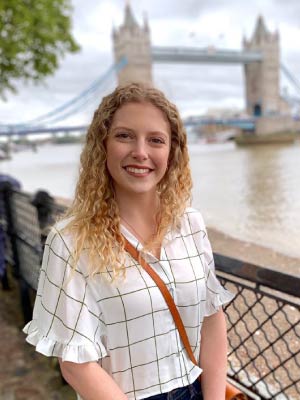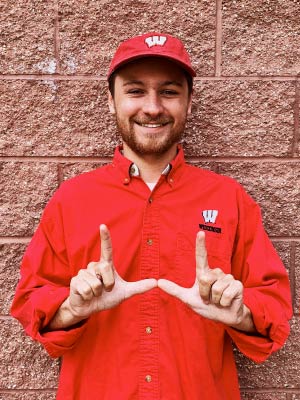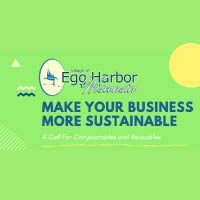The Village of Egg Harbor in Door County, Wisconsin is emerging as a local sustainability leader by initiating several projects that aim to improve the environmental, social, and economic wellbeing of the community. In addition to becoming the first Green Tier Legacy Community in Door County, Egg Harbor is also partnering with the UniverCity Year program (UCY) to improve the village’s infrastructure.
UCY is a University of Wisconsin–Madison program that connects university education, service and research activities with cities to further the practice of sustainability. In UCY’s partnership with Egg Harbor, a key goal is to eliminate single-use plastics within the village — something that Egg Harbor sees as essential to protecting the health of its Lake Michigan coastline, as well as encouraging sustainable living for its residents and visitors.
“In Egg Harbor, we realize that there are thousands of people that are going to visit here annually, and we started thinking about what we can do to minimize their environmental impact,” said Lydia Semo, Egg Harbor’s environmental and sustainability coordinator. “So, we set this goal to eliminate single-use plastics… not only to minimize pollution, but [to] inspire our visitors to act more sustainably when they return home, and [to] inspire our residents to travel more sustainably as well.”

The project was inspired by Egg Harbor’s “Green Tier Task Force,” which was formed shortly after Egg Harbor became a Green Tier Legacy Community in 2017. Green Tier is a Wisconsin Department of Natural Resources voluntary program that provides supportive resources to businesses and communities that commit to taking a systematic approach to improving their environment. For Egg Harbor, launching the Green Tier Task Force has resulted in sustainability initiatives including the installation of LED lights along the village roadways, energy-use evaluations, and the expansion of recycling and composting programs.
“Being a Green Tier Community has really helped us a lot,” said Semo. “It’s helped us better communicate and network with other communities in Wisconsin. And there’s just been nothing but positive sustainable goals, education, and communication that have come from it.”
Now entering its fourth year as a Green Tier Community, Egg Harbor’s sustainability goals are continuing to expand. This past year Egg Harbor has taken on perhaps its most ambitious plan yet — eliminating single-use plastics in the village.
A student steps up, and the project takes off
Eliminating single-use plastics is one of six sustainability projects that UCY is assisting with throughout its 2019-2022 partnership with Egg Harbor. The project took off in summer 2020, when University of Wisconsin–Madison undergraduate Dylan Lennie took on the initiative as the focus of an independent student research project.
Lennie is a senior at UW–Madison double majoring in environmental studies and physical geography, while also pursuing a Nelson Institute sustainability certificate. His work on the eliminating plastics project was overseen by Tim Lindstrom, a recent graduate of the Nelson Institute’s Environment and Resources PhD program and instructor of Environmental Studies 126: Principles of Environmental Science.

Lennie first met Lindstrom during the fall 2019 semester while taking Environmental Studies 126. At the end of the semester, Lennie asked Lindstrom for recommendations on possible internship opportunities, a request that Lindstrom said came at just the right moment.
“Dylan’s timing in this instance was perfect. I had just been contacted by Gavin Luter, Managing Director at UniverCity Alliance, who knew of the Egg Harbor opportunity and was reaching out to campus contacts,” said Lindstrom. “So, my role was merely to play matchmaker and then get out of the way once Dylan and the Egg Harbor folks were off and running.”
While Lindstrom served as an advisor to Lennie throughout the project, he took a “hands-off” approach that allowed Lennie to emerge as a leader. Likewise, Lindstrom said the UCY partnership was an opportunity for Lennie to gain real-world sustainability experience while also engaging in community service, something that is central to the Nelson Institute’s mission.
“I was thrilled to help facilitate this opportunity for Dylan because environmental stewardship in service of the Wisconsin Idea is central to the mission of the Nelson Institute and this partnership checked all the right boxes,” said Lindstrom. “It’s been immensely rewarding to observe Dylan grow over the years, and the Egg Harbor internship undoubtedly played a large role in shaping Dylan into the thoughtful, outward-focused, and soon-to-be-graduated person that he is today.”
Partnering with Egg Harbor to eliminate single-use plastics
Lennie began working in partnership with Egg Harbor at the beginning of 2020, at which point he was working with Semo to develop a single-use plastics elimination plan.
Initially, Lennie said the goal of the project was to begin the transition away from single-use plastics by surveying the plastic consumption of Egg Harbor businesses and then conducting a cost-benefit analysis for replacing plastic materials with compostable products.
But 2020 had other plans. With the onset of the COVID-19 pandemic, Lennie said it became clear that it was not the right time to be asking businesses to commit to reducing their use of plastic.
“The goals of the project switched completely a month in,” said Lennie. “COVID took hold and it was pretty clear that those goals weren’t necessarily going to work for this past summer. Because these businesses, who [rely on] that five-month summer period of people coming to Door County, took a huge hit just from lack of foot-traffic. And the businesses were more worried about how they would get through the summer health-wise… switching to compostable products wasn’t on the front burner.”
Realizing these challenges, Lennie pivoted to focus on preparing business owners to make the switch to compostable products.
Laying the groundwork for a plastic-free Egg Harbor
Instead of pushing businesses to eliminate plastics immediately, Lennie launched a communications campaign aimed at educating business owners on the negative impact of single-use plastics in the Great Lakes region and informing them of Egg Harbor’s goal to eliminate single-use plastics.
Engaging in this work initially took the form of daily phone calls and emails with business owners to get the conversation started. Lennie also created a flyer to communicate the initiative’s key points of information and published a blog post highlighting how Egg Harbor residents can become more sustainable consumers.

However, after several weeks of trying to connect with Egg Harbor businesses remotely, Lennie was finding it difficult to form meaningful connections through phone calls and emails. He felt like he hit a wall.
“I realized pretty quickly that I wasn’t going to get a lot done if I couldn’t physically go into businesses and knock-on doors and talk to owners to see what people were thinking about the project,” said Lennie. “So, I drove up there one weekend and printed out fliers and walked door-to-door [with Lydia Semo]. That was very successful. I got more done that weekend than I had accomplished in the past three weeks in terms of just general communication.”
Lennie was cognizant of the challenges he would face as an “outsider” coming to Egg Harbor to speak with business owners about transitioning away from single-use plastics. He said he initially felt some nervousness about going door-to-door, not wanting to be perceived as a stranger telling people how to run their businesses.
Recognizing the challenges that Lennie was facing, Semo said she was impressed by Lennie’s ability to make the best of a difficult situation.
“It can be hard coming into a small community as an outside voice and getting people to understand you and trust you. And [Dylan] did a really nice job with that,” said Semo. “He was very open with the business owners and he was very professional, and they appreciated that.”
Lennie said the majority of business owners were “on board” and excited about the village’s initiative to eliminate single-use plastics. In addition to directly communicating with business owners, Lennie also presented at a virtual town hall meeting, where he informed businesses and residents on how to make more sustainable lifestyle choices.
The presentation was broadcast via Facebook Live and Zoom. It provided information regarding the environmental impact of single-use plastics in Egg Harbor, as well as other sustainability topics, including energy-use, water-use, composting, and recycling. The second half of the presentation provided business-specific tips and resources for launching sustainability projects, demonstrating the village’s commitment to helping its local businesses achieve their sustainability goals.
Ultimately, Semo said the presentation served as one of Lennie’s most impactful contributions to the eliminating plastics project.
“[Dylan] essentially put together the whole presentation and just really knocked it out of the park,” said Semo. “We had a lot of positive feedback from that presentation and over 100 views of it just within the first day or so of it being on our website.”
The work continues
Egg Harbor is committed to helping businesses meet their sustainability goals. Semo said this will require a continued dialog about eliminating single-use plastics, as well as resources and assistance for businesses as they make this transition.
While the pandemic may have set back the timeline for eliminating single-use plastics in the village, Lennie feels confident in Egg Harbor’s ability to establish a plastic-free future.
“I think that in the future there’s a very good chance that Egg Harbor, it being a township along the coast of Lake Michigan, could take its businesses and make them plastic-free to advocate for the Great Lakes,” said Lennie. “And I think that would be huge if Egg Harbor could do that — [to set] an example for other municipalities along the Great Lakes.”
Likewise, Semo is optimistic about Egg Harbor’s future. She said she is encouraged by the progress made by UCY’s partnership with Egg Harbor last summer, and while there is much more work to be done, she has faith that through the village’s determined and forward-thinking spirit, a more sustainable future for the Great Lakes region is on the horizon.
“We [in Egg Harbor] have held ourselves to that standard of being the trailblazer and setting forth these sustainable initiatives,” said Semo. “It’s really a community effort. I’m glad that we’re able to do what we’ve been doing and I’m even more glad to see that other communities are following in our footsteps.”

The Village of Egg Harbor is home to 250 year-round and 2,500 seasonal residents. It is located on the Niagara Escarpment on the waters of Lake Michigan’s Green Bay and is one of the state’s top tourism destinations. In addition to being a Green Tier Legacy Community, the Village of Egg Harbor is a recipient of the Governor’s Tourism Stewardship Award. Read more about Egg Harbor’s commitment to sustainability.